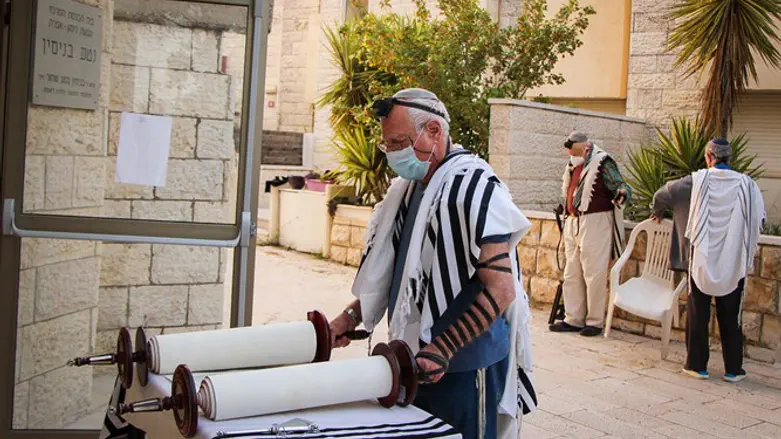
Rabbi Shmuel Slotky, who heads the International Association of Synagogues, told Arutz Sheva that he does not expect a significant change in the Health Ministry's coronavirus guidelines ahead of the High Holidays.
"We need to start thinking and planning the prayers for the High Holidays," he said. "It's true that we know less than we don't know, but it seems that we will not see a significant change in the Health Ministry guidelines."
"We need to prepare, and there are a few points that we need to take into account. We need to set up shade near synagogues or in public places, in order to allow people to gather according to the guidelines and hold public prayers. We need to organize, especially ahead of the High Holidays, with cantors who can lead the public. Usually we count on a small number of cantors, but we need to take into account that we will need more, and there will be more groups praying, so we need to train new [cantors]. We also need to train people to blow shofar (the traditional ram's horn - ed.), because we'll need more of them."
Rabbi Slotky also discussed the initiative to link shofar-blowers up with those who need them. "We, together with other bodies, are trying to create an app which will connect those who need a shofar-blower with those who know how to blow, obviously ahead of the holiday. Anyone who wants to hear the shofar will note it in the app, and it will locate the nearest shofar-blower to his place of residence, and the two can coordinate with each other. This is relevant because there will be people in quarantine and they will need to blow in places where people will hear even if they are in their homes."
According to him, it is also important to find ways to shorten the prayers which are in line with Jewish law.
"The coronavirus period places us in a positive place when it comes to differentiating between what is more and less important," he said. "In the prayers, there are parts that are the main parts and which are obligated by the Torah itself, and there are other things."
"In this period, when we need to balance regular prayers with the heat and uncomfortable conditions - we will need to preserve what is most important, and leave the other things for years in which we can pray in an air-conditioned synagogue. Therefore, we will put out organized instructions regarding what to skip to minimize the discomfort, and how to hold public prayers with what is most important, and people can say the rest in their homes."
"I am convinced that we will need these preparations," Rabbi Slotky added. "Even according to the easier route that allows more people to pray in synagogue, there are many people who are in high-risk groups and they also want to pray, and in a closed space, that will be problematic."
"In my estimation, it will not be just for them, but for most of the public, and it would be good and proper to prepare. It's worth being prepared so that we can provide the people who need the High Holiday experience with whatever we can give them."
